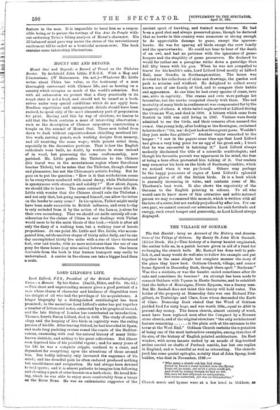LORD LILFORD'S LIFE.
Lord Lilford, P.Z.S., President of the British Ornithologists' Union : a Memoir. By his Sister. (Smith, Elder, and Co. 10s. 6d.) —This short and unpretending memoir gives a good portrait of a man whose charm of character and kindness of disposition were the delight of all who had the privilege of his acquaintance. A longer biography by a distinguished ornithologist has been promised; in the meantime Lord Lilford's sister has put together a number of letters and notes, connected by a biographical thread, and the late Bishop of London has contributed an introduction. Thomas, fourth Baron Lilford, died in 1h96. The study of ornith- ology and the keeping of live birds in captivity were the ruling passion of his life. After leaving Oxford, he had travelled in Spain, and made long yachting cruises round the coasts of the Mediter- ranean, examining with zeal the natural history of many little- known districts, and adding to his great collections. But illness soon deprived him of his youthful vigour; and for many years of his life he was a complete cripple, confined to a chair, and dependent for everything upon the attentions of those around him. But bodily infirmity only increased the eagerness of his mind ; and the dreadful pain he often endured produced nothing but unselfishness and resignation. He had always been devoted to field sports; and it is almost pathetic to imagine him following and cheering a pack of otter hounds in a bath-chair. He loved fish- ing, which he was able to enjoy more comfortably from a barge on the River Nene. He was an enthusiastic supporter of the ancient sport of hawking, and trained many falcons. He had been a good shot and always preserved game, though he declared that no hawks in this country were numerous or strong enough to do appreciable damage to game, except the sparrow- hawks. He was for sparing all birds except the crow family and the sparrowhawks. He could not bear to hear of the death of an owl, and had no patience with the ignorance of game- keepers and the stupidity of game preservers. He declared he would far rather see a peregrine strike down a partridge than kill fifty brace with his gun. When he was not compelled to travel for his health's sake, Lord Lilford lived mostly at Lilford Hall, near Oundle, in Northamptonshire. The house was devoted to his collections of skins and drawings, the garden and park to aviaries and wildfowl. He delighted to collect every known sort of one family of bird, and to compare their habits and appearance. At one time he had every species of crane, save one, alive in captivity. The cranes and owls were perhaps his favourites, but the hawks competed closely with them. The sad mortality of many birds in confinement was compensated for by the longevity of others. A white-tailel eagle arrived at Lilford during the Crimean War, and died in 1898. A bittern which came from Norfolk in 1865 was still living in 1887. Visitors were freely admitted to see the birds, and their remarks often amused the . owner. One young lady, after looking at the flamingoes, exclaimed to her mother: " 0 h, ma ! do just look at these great geese. Wouldn't they just make fine giblets!" Another visitor remarked to the keeper : "I saw in the papers some time ago that Lord Lilford had given a very long price for an egg of the great auk ; I trust that he was successful in hatching it." Lord Lilford always modestly disclaimed the title of a scientific ornithologist; and though his favourite pursuit was uppermost in his mind, the fear of being a bore often prevented him talking of it. Our readers may remember his book on the birds of Northamptonshire, which we noticed when it was published. Others may perhaps be the happy possessors of copies of Lord Lilford's splendid coloured plates of all the British birds. It is a book which is annually increasing in value, and contains some of Mr. Thorburn's best work. It also shows the superiority of the German to the English printing in colours. To all who would care to know more of this attractive and noble.natured person we may recommend this memoir, which is written with all the love of a sister, but not unduly prejudiced by affection. For our own part, we cannot conceal our admiration for such fortitude and energy, such sweet temper and generosity, as Lord Lilford always displayed.






















































 Previous page
Previous page